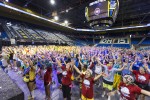Sarah Denison-Johnston’s feet began to ache from dancing during the ninth hour of UCLA’s 14th Annual Dance Marathon, but a constant stream of supportive text messages from her mom helped her continue through the 26 hours.
Denison-Johnston’s mother, Rebecca Denison, has been living with HIV for more than 30 years.
The annual Dance Marathon event raised about $446,157 this year to combat pediatric AIDS, though about 180 fewer dancers participated this year than last year. Each participant fundraised $260, up $10 per person from last year.
Before Denison-Johnston, a first-year undeclared student, committed to UCLA, she and her mother attended a welcome event and watched a video about the university that included a clip from Dance Marathon. She said it inspired her to participate before she had even decided on a school.
Rebecca Denison was HIV positive before becoming pregnant and was one of the first seven women to participate in clinical trials aimed toward reducing mother-to-child HIV transmission, Denison-Johnston said.
After receiving her diagnosis and hearing that she only had six months to live, Denison formed an organization to offer additional resources for women living with HIV, called Women Organized to Respond to Life-threatening Disease, or WORLD. Though her mother has since left the organization and has far outlived that diagnosis, Denison-Johnston said her mom is committed to HIV-prevention activism and is proud of her for participating in Dance Marathon.
“There was an a cappella group who sang ‘Lean on Me’ (during the fundraiser), which is sort of the anthem for the organization she started, so I sent her a video and she started crying,” Denison-Johnston said.
Denison-Johnston was one of about 700 participants who stayed on their feet for the 26-hour event as a symbol of standing up against AIDS. Though students weren’t allowed to sit, they didn’t have to dance throughout. Participants received five meals each and dressed up in themed costumes during the event. On the side, they could attend yoga sessions or participate in small competitions.
Some dancers said they were re-energized by the moralers, who each paid $30-$40 to attend for three-hour shifts, but were physically exhausted during the final minutes.
“I danced so hard earlier that I can’t really move my legs anymore,” said third-year sociology student Jennifer Wong. “Since this is my first year, I didn’t know what to expect … I like that everyone is coming together not because we hate USC, but for a cause.”
Wong said she was motivated to finish because of the volunteers’ passion and because members of the Pediatric AIDS Coalition were energetic throughout the fundraiser.
“(Having finished), I know about the cause more and why Dance Marathon has been running as long as it has been,” Wong said.
Many dancers were returning after participating in previous years.
“After coming out of it at the end of the full 26 hours, you feel like you not only did something awesome, but that you can do anything,” said Christine Cocheteux, a fourth-year economics student participating for the second year.
As Denison-Johnston’s mother texted her throughout the event, they exchanged words of encouragement and updates on performances and activities happening in between dancing.
“It’s a commitment to prove yourself and also make a difference,” Denison-Johnston said. “I think some people are here to prove to themselves, and others are here to make a difference.”
Contributing reports by Lindsay Weinberg.
